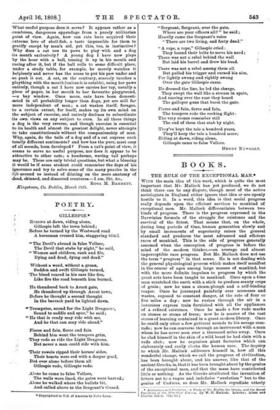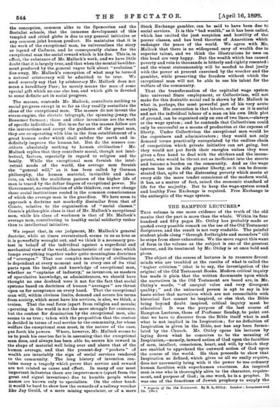BOOKS.
THE RULE OF THE EXCEPTIONAL MAN.* WITH the main idea of this work, which is quite the most important that Mr. Mallock has yet produced, we do not think there can be any dispute, though most of the active sociologists in England either ignore that idea or are openly hostile to it. In a word, this idea is that social progress really depends upon the efficient services to mankind of exceptional men. Mr. Mallock differentiates between two kinds of progress. There is the progress expressed in the Darwinian formula of the struggle for existence and the survival of the fittest. That means that, on the whole, daring long periods of time, human generation slowly and by small increments of superiority raises the general standard and produces the most advanced and efficient races of mankind. This is the aide of progress generally assumed when the conception of progress is before the mind of the modern thinker,—an average and almost imperceptible race progress. But Mr. Mallock does not use the term " progress " in that sense. He is not dealing with the general physiological process which makes itself manifest in the course of ages among large masses of mankind, but with the more definite impulses to progress by which the great arts have been taught to mankind. Once upon a time man scratched the earth with a stick to produce scanty crops of grain ; now he uses a steam-plough and a self-binding reaper. Once he journeyed painfully over morasses and wastes, exposed to constant danger, at the rate of four or five miles a day ; now he rushes through the air in a luxurious express train furnished with all the appliances of a refined existence. Once he made a few rude marks on stones or stems of trees; now he is master of the vast stores of learning contained in a great modern library. Once he could only utter a few guttural sounds to his savage com- rade ; now he can converse through an instrument with a man whom he has never seen over a thousand miles away. Once he clad himself in the skin of a wild beast be had slain with a rude club ; now he organises giant factories which can elaborately and easily clothe the human race. The inquiry to which Mr. Mallock addresses himself is, how all this wonderful change, which we call the progress of civilisation, has been brought about, and his answer, like that of the ancient Greeks, is, that it has been brought about by the genius of the exceptional man, and that the mass have contributed little or nothing. As the Greeks attributed the invention of letters not to a vague and indefinite "evolution" but to the genius of Cadmus, so does Mr. Mallock repudiate utterly
• Aristocracy and Evointion a Study of the Rights, the Origin, and the Social Functions of the Wee thier Cia.sia By W. II. Matlock. London: Adam anti Charles Black. (12s. GI 1
the conception, common alike to the Spencerian and the Socialist schools, that the immense development of this templed and citied globe is due to any general initiative or any common joint human product. He maintains that it is the work of the exceptional man, he universalises the story or legend of Cadmus, and he consequently claims for the exceptional man the social reward which is his due. This is, in effect, the substance of Mr. Mallock's work, and we have little doubt that it is largely true, and that when the mental bewilder- ment produced by the general vague talk about "evolution" dies away, Mr. Mallock's conception of what may be termed a natural aristocracy will be admitted to be true. We need scarcely say that by aristocracy Mr. Mallock does not mean a hereditary Peer ; he merely means the man of some special gift which no one else has, and which gift is devoted to some definite act in social progress.
The masses, contends Mr. Mallock, contribute nothing to social progress except in so far as they readily assimilate the ideas of the exceptional man. The masses do not invent the steam-engine, the electric telegraph, the spinning-jenny, the Bessemer furnace ; these and other inventions are the work of specific individuals. But in so far as the masses follow out the instructions and accept the guidance of the great man, they are co-operating with him in the firm establishment of a great human order which shall subdue the earth and in- definitely improve the human lot. Bnt do the masses con- tribute absolutely nothing to human civilisation ? Mr. Mallock replies that they contribute moral, though not intel- lectual, factors, especially in regard to religion and the family. While the exceptional men furnish the intel- ectual needs of the world, the average men furnish the "general will," as it has been called by German philosophy, the human material, invincible and abso- lute, on which the multiform pattern of the higher life of man is traced by the defter fingers of exceptional power. No Government, no combination of able thinkers, can ever change those social institutions rooted in the common consciousness of which the average man is the guardian. We here seem to approach a doctrine not markedly dissimilar from that of Comte, relative to the organisation of " social classes." Comte's philosophic class is that of Mr. Mallock's exceptional men, while his class of workmen is that of Mr. Mallock's average men, contributing to healthy social solidarity rather than to intellectual initiative.
We repeat that, in our judgment, Mr. Mallock's general doctrine, while at times overstrained, seems to us as true as it is powerfully wrought out, and we think it a necessary pro- test in behalf of the individual against a superficial and mechanical view of the world, characteristic of our time, which lumps everything together under quite meaningless doctrines of " averages." That our complex machinery of civilisation is dependent at every moment and in every one of its vital parts upon the insight and knowledge of exceptional men, whether as " captains of industry," as inventors, as masters of speculative knowledge, as administrators, we should have thought no one doubted were it not for the fact that social systems based on doctrines of human " averages " are thrust upon us for acceptance on every hand. That the exceptional man will, within obvious limits, demand and secure his terms from society, which must have his services, is also, we think, a truism. That the real force (apart from religion and morals) operating in the world is not the mere struggle for existence, but the contest for domination by the exceptional men, also seems to us true; taken with the proposition that the contest is decided in terms of real service to the community, for whose welfare the exceptional man must, in the nature of the case, put forth his powers. Where, however, Mr. Mallock seems to us to push his case too far is in assuming that the exceptional man does, and always has been able to, secure his reward in the shape of material well being over and above that of the human average, and that the present-day " pockets " of wealth are invariably the sign of social services rendered to the community. The long history of invention con- tains many a tragedy which prove that service and reward are not related as cause and effect. In many of our most important industries there are improvements (apart from the great and signal inventions) due to humble people whose names are known only to specialists. On the other hand, it would be bard to show how the rewards of a railway wrecker like Jay Gould, of a mere mining speculator, or of a mere
Stock Exchange gambler, can be said to have been due tc social services. It is this "bad wealth," as it has been called, which has excited the just suspicion and hostility of the poorer classes, and has bred theories of Anarchism which endanger the peace of the world. We agree with Mr. Mallock that there is no widespread envy of wealth due to superior talent, and we think the illustrations he uses on this head are very happy. But the wealth which has caused poverty and ruin to thousands is bitterly and rightly resented; and the wisest statesmanship will be needed to deal justly with the power at present exercised by the wrecker and the gambler, while preserving the freedom without which the exceptional man will not be able to use his talent for the welfare of the community.
That the transformation of the capitalist wage system into universal State employment, or Collectivism, will not make for this desirable social end is shown by Mr. Mallock in what is, perhaps, the most powerful part of his very acute analysis. His contention is that labour, so far as it is social and not the individual labour of a man on his own little plot of ground, can be organised only on one of two lines,—slavery or the wage system ; and he contends that Collectivism could only be successful as a means of production at the expense of liberty. Under Collectivism the exceptional men would be the organisers and administrators ; they would not only demand terms practically unregulated by the endless chain of competition which private initiative can set going, but they would not put forth their energies unless they were given a free hand to deal with the shirkers and the incom- petent, who would be thrust out as inefficient into the streets and become a burden on the community. And as the wage system has on its side greater liberty, so it can be demon- strated that, spite of the distressing poverty which meets at every side the more tender conscience of the modern world, it has, as a matter of fact, raised the economic standard of life for the majority. But to keep the wage-system sound and healthy Free Exchange is required. Free Exchange is the antiseptic of the wage system.



































 Previous page
Previous page